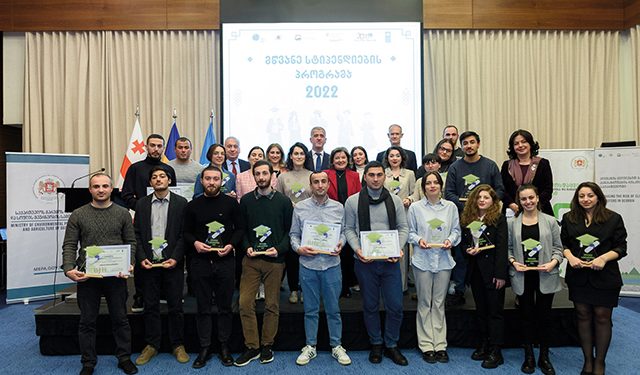Thirty-two students from eight Georgian universities received “Green Scholarships” to continue their graduate studies in ecology, hydrology, geology, energy, mineral resources management, sustainable development and environmental policy.
Representatives from UNDP, the Swedish Embassy, the Ministry of Environmental Protection and Agriculture and the Environmental Information and Education Center handed over the scholarship certificates on 20 December.
UNDP and the Government of Georgia, with funding from the Green Climate Fund (GCF), Swiss and Swedish governments are implementing a 7-year program dedicated to reducing the risk of climate-driven disasters in Georgia.
With an overall budget of $74 million, the initiative comprises three interrelated projects:
• Scaling-up Multi-Hazard Early Warning System and the Use of Climate Information in Georgia with USD 27 million funding from the Green Climate Fund (GCF);
• Strengthening the Climate Adaptation Capacities in Georgia with USD 5 million funding from the Swiss Agency for Development and Cooperation (SDC); and
• Improved Resilience of Communities to Climate Risks with USD 4 million funding from the Swedish International Development Cooperation Agency (SIDA).
The program is co-financed by the Government of Georgia with $38 million.
The initiative aims to reduce exposure of Georgia’s communities, livelihoods and infrastructure to climate-induced natural hazards through a well-functioning nationwide multi-hazard early warning system and risk-informed local action.
In close cooperation with the Ministry of Environment Protection and Agriculture of Georgia, National Environmental Agency, National Food Agency, Environmental Information and Education Centre, Emergency Management Service, the Ministry of Internal Affairs and the Ministry of Regional Development and Infrastructure, UNDP works to:
• Upgrade and expand the hydrometeorological and agrometeorological monitoring network, and support establishment of centralized multi-hazard risk information and knowledge system, consisting of national e-Library, databases, information systems and knowledge portal. Local-level detailed hazard mapping and risk and vulnerability assessment will be developed.
• Address gaps in national coordination and institutional setup for effective early warning system (EWS) resulting in a functioning coordination mechanism and communication protocols for early warning. Capacities of decision-makers and national institutions involved in generating, processing, communicating, and using the warnings and other climate information will be enhanced. National and local integrated early warning systems by hazard and sectors will be developed and implemented.
• Secure delivery and use of the early warnings and climate advisories with end-users. Communities’ capacity to effectively utilize the EWS information and products and respond to climate-related disasters through planning and implementing structural and non-structural resilience measures will be enhanced. In addition, the project will implement priority structural intervention measures in high-risk areas addressing the most vulnerable communities (based on sound cost-benefit analysis using the socio-economic risk model) to reduce the risks that the EWS will be designed to address.














